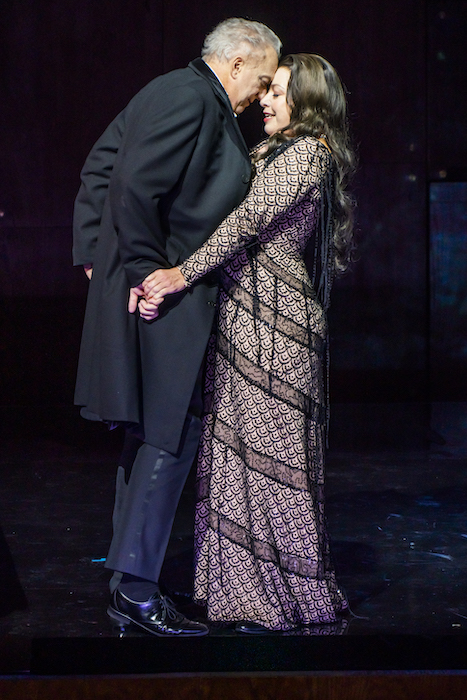Singers overcome juvenile staging in Philharmonic’s Schoenberg-Bartok double bill

There are many kinds of love; familial, platonic, tragic, courtly, unrequited. Then there’s expressionist love, a unique psycho-sexual context most often confined to literature, film, and of course opera.
Jaap van Zweden and the New York Philharmonic are delivering a chunk of that burning love in their concerts at David Geffen Hall this week, with a double bill of Schoenberg’s Erwartung and Bartok’s Bluebeard’s Castle, unified by the staging concepts of director Bengt Gomér.
The most obviously fine feature of Thursday night’s performance was the singing, with mezzo-soprano Katarina Karnéus in Schoenberg’s monodrama, and soprano Nina Stemme as Judith opposite baritone Johannes Martin Kränzle’s Bluebeard.
Stemme is an international star, renowned for her dramatic performances in Wagner and Strauss operas. Karnéus is less seasoned, but was no less capable. The staging attempted to connected the two works thematically and theatrically.
Before the first half’s Erwartung, Stemme came out and, in quasi-character, sang an arrangement of Schoenberg’s song “Erwartung” (Op. 2, no. 1), accompanied by harpist Nancy Allen. Likewise, Bluebeard opened with a spoken introduction (almost always omitted), delivered by Karnéus as the unnamed woman from the first half’s staging.
The gesture had mixed success with the underlining feeling hokey. But credit Stemme for her ravishing tone and Karnéus for her theatrical commitment. The quality of their performances made it almost seem as if the characters were warning each other.
That formal circularity was intriguing, a mirror enclosing the stories that were already trapped in interiors. But Gomér doesn’t know when to leave well enough alone. There was a juvenile fussInes to the details in each staging that was irritating and distracting.
Erwartung began in a morgue on the platform that was built behind the orchestra, a draped body on a gurney surrounded by men in tuxedos and lab coats (one of them was Kränzle). They performed an operation, perhaps an autopsy, all in extended silence. This made one impatient for Karnéus’ entrance, and when she came on she proceeded to blow away the staging, which literally became an array of haphazard detritus she stumbled through in the forest of her own mind.
Erwartung is Schoenberg’s finest score. His rationalist systemization of atonality disguised his irrational nature–his obsession with both numerology and psychodrama. Karnéus expressed the mercurial fascination and power in the music, altering her articulation from phrase to phrase, and within lines, and shifting dynamics and emotional intensity with fluid, exact gradations.
She was involved with the music, in touch with every fleeting feeling, from joy to jealousy to despair. The Philharmonic was an equal partner, playing under van Zweden with colors and timbres that brought out the beauty in the score, with exceptional woodwind balances and sighing strings.
This was a sensational performance that overcame the final, silly touches, including Karnéus injecting herself with narcotics—she’s a neurasthenic drug addict, see?—and, in the final moments, Kränzle pulling something out of her baggage, which turned out to be a…megaphone?
She used the megaphone from time to time as she performed the spoken prologue to Bluebeard, and one admired her gravity and her game face, as it was little more than a gimmick, a meaningless embellishment on an idea that, as it was working already, diminished its effect. As with the first half, though, Stemme and Kränzle’s performances overcame the things Gomér asked them to do.
The goal seemed to emphasis the difference in age between Judith and Bluebeard, with the latter moving, and at times struggling, around the stage in a manner that emphasized physical fragility, as well as some mental silliness. There was slapstick sexual grappling, and a sense that Gomér was forcing the idea of love between the two.
One wondered why he couldn’t hear that in the score. With no introduction or context, it may seem difficult to make the love between the two characters real enough so that one believes that Judith could force Bluebeard to open the fateful doors in his castle, and that she herself would choose to remain with him after each room is revealed.
Yet that is what makes Bluebeard such a great opera, because Bartók’s score produces those feelings in the listener. This nearly didn’t come off, though. After the convincing playing of Erwartung, the Philharmonic seemed outside of Bartók’s world, getting the technical details right but not capturing his aesthetic. Stemme’s focus and power, and Kränzle’s clear, assured singing did it all. The characters age, the influence they had over each other, the sense that they were lost in, and would be lost without, each other came through with absolute clarity and strength in their singing.
They carried the drama up to the opening of the fifth door. At that point, Bartók’s writing is so extraordinary and grand that he himself seemed to force the orchestra into his world. To that, Kränzle’s singing added a visceral sinister touch—the combination of beauty and foreboding boosted the performance to a higher level. The staging remained awkward, Judith and the previous wives standing around, looking for something to do, but the sublime music carried it home.
The program will be repeated 8 p.m. Friday and Saturday. nyphil.org


